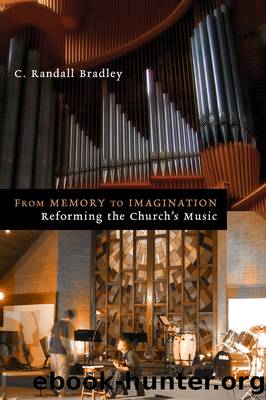From Memory to Imagination by Bradley C. Randall;

Author:Bradley, C. Randall;
Language: eng
Format: epub
Publisher: Eerdmans
Published: 2012-08-15T00:00:00+00:00
Making Music in Community
Becoming Collaborative All music-making in the context of community should be collaborative. While music-making is rarely effective without leadership, leadership itself can be collaborative. Wise leaders learn to trust other musicians on the team to make both musical and non-musical decisions. For instance, in a choral rehearsal, sometimes the ear of the accompanist is superior to that of the director, and they can work together to correct out-of-tune passages and to remedy errors. Similarly, in a rehearsal with a band, the tempo that the group settles into may be more appropriate than the one that the leader had in mind, and while the leader may be a good guitar player, he may have little skill in helping the drummer establish the best groove.
Of course, there are factors that in some cases indicate that the leader should make the decision â if a decision is controversial, has pre-existing baggage, must be made quickly, or must be made based on information that cannot be shared with the group. But a general rule of thumb is this: If a decision can be made collaboratively and within appropriate time constraints, involve others.
Itâs true that collaboration can be messy and time-consuming, and sometimes involving others means sacrificing quality in the short term. But eventually the investment of time and training is well worth the initial sacrifices. In a Christian community, if others can be involved, they should be! It is our responsibility to share leadership with others who are qualified or who are perceived to have leadership potential.
Being Parts of the Whole The goal of music within the community of faith is to combine many individual parts to create a complete picture. Musically, it takes many instruments to create an orchestra and many voices to form a choir. The biblical model of the communityâs being different parts of the body in order to complete the body of Christ is applicable to music-making. When each person plays a part in the âorchestraâ or sings a part in the âchoir,â the masterpiece that results is much larger and more complete than anything that any of us could create on our own. Therefore, in worship, music speaks textually, musically, and metaphorically as well.
Download
This site does not store any files on its server. We only index and link to content provided by other sites. Please contact the content providers to delete copyright contents if any and email us, we'll remove relevant links or contents immediately.
| Book of Common Prayer | Catechisms |
| Devotionals | Hymns & Hymnals |
| Meditations | Monasticism & Asceticism |
| Pentecostal & Charismatic | Prayerbooks |
| Rites & Ceremonies | Sacraments |
The Secret Power of Speaking God's Word by Joyce Meyer(3220)
More Language of Letting Go: 366 New Daily Meditations by Melody Beattie(3030)
To Light a Sacred Flame by Silver RavenWolf(2823)
How Proust Can Change Your Life by Alain De Botton(2814)
Anxious for Nothing by Max Lucado(1976)
A TIME TO KEEP SILENCE by Patrick Leigh Fermor(1913)
Curse Tablets and Binding Spells from the Ancient World by Gager John G.;(1862)
The Gnostic Gospel of St. Thomas by Tau Malachi(1799)
7 Secrets of Divine Mercy by Vinny Flynn(1746)
all by Unknown Author(1682)
365 Tao: Daily Meditations by Ming-Dao Deng(1622)
From Good Goddess to Vestal Virgins: Sex and Category in Roman Religion by Ariadne Staples(1575)
100 Days of Thanks by Thomas Nelson(1570)
To Ride a Silver Broomstick by Silver RavenWolf(1569)
Anam Cara by John O'Donohue(1565)
The Fasting Edge by Jentezen Franklin(1539)
To Stir a Magick Cauldron by Silver RavenWolf(1523)
The Sacred Enneagram by Christopher L. Heuertz(1431)
New Morning Mercies by Paul David Tripp(1397)
